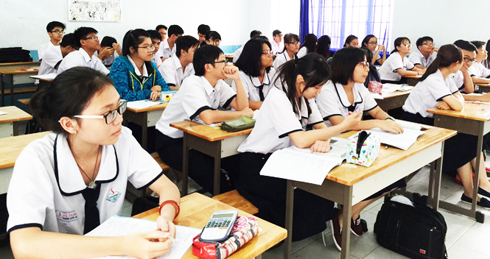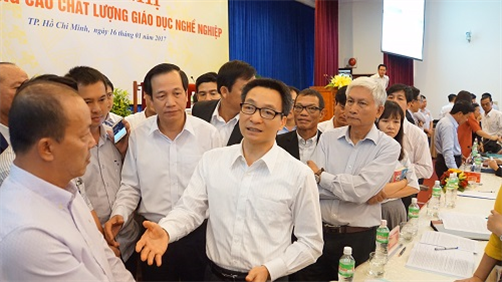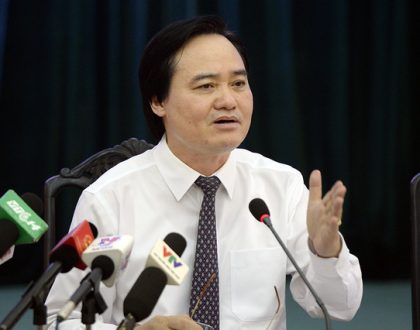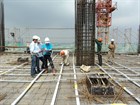After being promoted, do the salary and allowances of teachers naturally increase? This is a question that Legal Secretary has recently received quite frequently from our Valued Customers and Members. Legal Secretary would like to specifically address this issue in the following article.

Illustration Image
 SALARY TABLE FOR TEACHERS OF ALL LEVELS FROM JULY 1, 2020 (OFFICIAL)
SALARY TABLE FOR TEACHERS OF ALL LEVELS FROM JULY 1, 2020 (OFFICIAL)
According to the current regulations in Law on Public Employees 2010, public employees working at a job position shall be appointed to the corresponding professional title of that job position. In case the public service provider has a demand and the public employee meets all conditions and standards as prescribed by law, the public employee may register for the examination or consider promotion in professional titles.
According to the provisions of Circular 28/2017/TT-BGDDT, one of the conditions for teachers to register for the exam for promotion in professional titles is to have adequate training, fostering, professional competence, and the professional title at the rank registered for examination as specified in the Joint Circulars 20/2015/TTLT-BGDDT-BNV, 21/2015/TTLT-BGDDT-BNV, 22/2015/TTLT-BGDDT-BNV, and 23/2015/TTLT-BGDDT-BNV. Moreover, the assignment of teachers to the examination for promotion in professional titles, fostering standards of professional titles shall be based on job positions, structure of professional titles, demands of public education institutions, and the actual conditions at the localities, not applied to all teachers.
Thus, it can be seen that not all teachers will be eligible to take the examination/consider promotion in professional titles; only when the educational institution has a need and the teacher fully meets the conditions of the rank for the registered exam shall they be allowed to participate.
The question raised here is whether all teachers after promotion will naturally enjoy higher salaries? Thu Ky Luat's answer is no.
To be specific, according to Clause 2, Article 15 of Circular 12/2012/TT-BNV, Section II Circular 02/2007/TT-BNV, the salary arrangement after the promotion of officials and public employees is regulated as follows:
- In case the individual has not received the seniority allowance exceeding the frame in the old rank, the salary coefficient being enjoyed in the old rank shall be used as a base for arranging the new rank’s salary coefficient that is equal to or nearest to the higher one in the new rank. The time for enjoying the salary in the new rank shall be calculated from the date of signing the decision of appointment to the new rank.
- In case the individual is enjoying the seniority allowance exceeding the frame in the old rank, the total salary coefficient plus the seniority allowance exceeding the frame being enjoyed in the old rank shall be used as a base for arranging the new rank’s salary coefficient that is equal to or nearest to the higher one in the new rank. The time for enjoying the salary in the new rank and the time for the next salary raise in the new rank shall be calculated from the date of signing the decision of appointment to the new rank.
- In case the total salary coefficient plus the seniority allowance exceeding the frame being enjoyed in the old rank is higher than the last step of salary coefficient in the new rank, the individual shall be arranged in the last step of salary coefficient in the new rank and shall enjoy an additional differential coefficient reserved equal to the total salary coefficient plus seniority allowance exceeding the frame being enjoyed in the old rank. The time for enjoying the salary in the new rank (including the differential coefficient reserved) and the time for considering seniority allowance exceeding the frame in the new rank shall be calculated from the date of signing the decision of appointment to the new rank.
This differential coefficient reserved shall be enjoyed throughout the officials and public employees’ time of being arranged in the new rank. Subsequently, if the officials and public employees continue to be promoted or transferred to another rank, this differential coefficient reserved shall be added to the salary coefficient (including seniority allowance exceeding the frame, if any) being enjoyed to arrange the salary in the appointed rank upon promotion or transition of rank and shall cease to enjoy the differential coefficient reserved from the date of enjoying the salary in the new rank.
Hence, after promotion, depending on the current salary coefficient and allowance being enjoyed, the new salary and allowance of the teacher shall change, possibly being equal to or greater than the current salary, but not necessarily higher than the current salary.
Nguyen Trinh
 Article table of contents
Article table of contents









